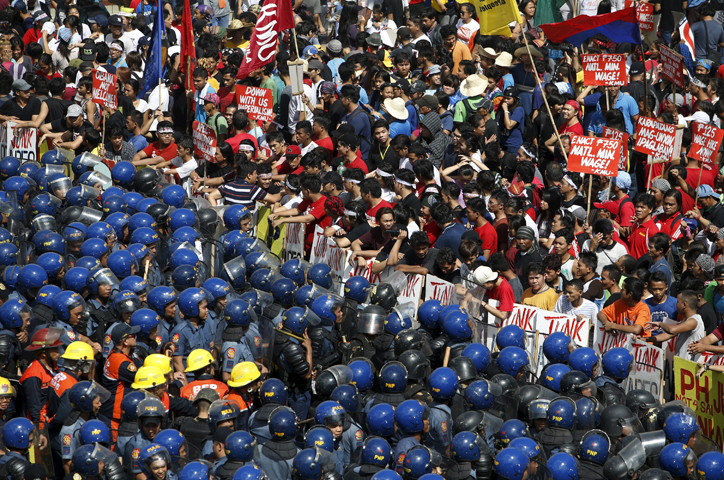
Protesters face riot police near the venues of the Asia-Pacific Economic Cooperation (APEC) summit in the capital city of Manila, Philippines Nov. 19. (CNS/Edgar Su, Reuters)
More than 500 protesters in Manila, including dozens of Catholic religious and other Christians, called for doing away with the Asia-Pacific Economic Cooperation (APEC) forum.
On Nov. 19, the last day of the summit in which leaders of 21 economies from the Asia-Pacific met to address trade and economic concerns, protestors gathered in the 92-degree heat and yelled, "Junk-junk APEC!" over and over. Vincentian Fr. Edprim Gaza was among them.
"I represent the church stance of calling our leaders of our country not to participate in this kind of meeting, which aims only to plunder our natural resources and plunder, oppress and suppress our poor people," Gaza told Catholic News Service. The priest is based in Manila but works closely with indigenous people on the southern island of Mindanao. He said their main concern is "their ancestral land."
He said U.S. President Barack Obama was saying that APEC "must take care of the ecology of the poor country. But the reality (is) in the Philippines, especially the multinational corporations of mining, do not respect our nature," Gaza said.
Agong Capus with the Promotion of Church People's Response, an ecumenical advocacy group for the marginalized in the Philippines, has also been working indigenous people from the South.
One indigenous group holed up at Our Mother of Perpetual Help Church just south of Manila was also holding protests opposing APEC, saying there was no benefit to the poor. Their group was supposed to meet the larger group where the Vincentians were, but they were hemmed in by the blocked off roads that were used only by visiting leaders and their delegations.
"Church people have this opportunity to use various avenues to speak on their behalf," Capus told CNS. He said the government must "sit down and listen." He also said it must "really put an end to the causes of this suppression, of this marginalization."
As host of this year's summit, the Philippines chose the theme "inclusive growth." The idea was to look more closely at ways to prop up micro, small and medium businesses.
During one of the multiple conferences leading up to the summit, APEC ministers came up with an agenda that would facilitate the steps needed for small entrepreneurs to get into e-commerce. They also came up with a repository of each of the member economies' requirements and steps needed for smaller business enterprises to use as a guide to help them market to those economies.
Renato Reyes of the New Patriotic Alliance, one of the rally organizers, called these "neo-liberal" proposals and said protesters rejected them.
"We've been following that prescription for the last two decades and our country has remained underdeveloped, a lot more people are unemployed, poor, hungry so it's not really working. It's a big failure," he said.
During the APEC meeting, the president of the bishops' conference said the APEC leaders should create policies that would give the marginalized a voice.
In a statement on the Catholic Bishops' Conference of the Philippines website, Archbishop Socrates Villegas of Lingayen-Dagupan said, "It's about empowering the poor so they are heard because we are so used to looking at the poor as recipients of help."



